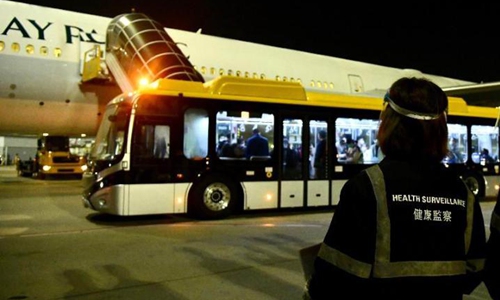Spring approaches for China’s cargo transport industry
By Tu Lei Source:Global Times Published: 2020/4/23 18:24:32
Favorable policies pledged to help aviation sector further its non-passenger potential

Hong Kong residents brought back from China's Hubei province by the Hong Kong SAR government's chartered flights arrive in Hong Kong on March 26, 2020. (Photo credit: www.info.gov.hk)
The pandemic has presented a hard blow to global passenger transport but has become an opportunity for cargo transport, as the Chinese government has vowed to support cargo traffic in various ways.
In a joint file released by several departments including the Ministry of Commerce and the Civil Aviation Administration of China (CAAC), support was pledged to airlines in opening all-cargo flights, including cargo-only services, and more benefits were also promised for flight slots and route freedom.
The file revealed international freight capacity covering major countries and regions around the world needs to be improved, capacity shortages should be eased, and airline resumptions or increased numbers of cargo flights should be promoted.
The file came amid a period of historic suffering for the aviation industry. Countries are blocking overseas flights, passengers are suspending journeys and businesspeople are opting to join online meetings instead of flying.
The International Air Transport Association (IATA) has released an updated analysis of the situation, showing the COVID-19 crisis will see airline passenger revenues drop by $314 billion in 2020, a 55 percent decline compared to 2019. It also warns more airlines will face bankruptcy if things do not get better.
IATA said that by February, the negative impacts of the COVID-19 crisis on air cargo demand were becoming visible and significant cargo capacity was lost as a result of airlines reducing passenger operations in response to government travel restrictions, severely impacting global supply chains.
However, domestic demand in the Chinese market began to lead the global recovery when the daily rate of new COVID-19 infections in China fell into single digits and moved toward zero. There was an early upswing from mid-February to the first week of March, as the number of domestic flights plateaued at just over 40 percent of pre-COVID-19 levels.
In addition, the government is encouraging airlines to shift from passenger flights to cargo-only services in a bid to transport more medical supplies and goods around the world.
The CAAC said on Wednesday that since February, the regulator has approved a total of 3,178 all-cargo flights for Chinese and foreign airlines, and 1,873 cargo-only flights - converted from passenger flights - for Chinese and foreign airlines, which "has greatly eased the capacity shortage."
From April 20 to 26, China is maintaining regular cargo flights with 93 overseas destinations in 45 countries. China plans to implement 1,989 cargo flights every week, an increase of 17.7 percent compared to last week, and an increase of 96.2 percent from pre-COVID-19 levels.
The recently released policies are highly focused on the practical issues faced by the cargo aviation industry, and they provide clear guidance on the direction of policy optimization in terms of all-cargo aircraft transfer, cargo time, international hub airport clearance, and air cargo standards, SF Express said in a note sent to the Global Times on Wednesday.
SF Express now has 13 international cargo routes, and flies a total of 20 flights per week.
However, data from industry information provider VariFlight showed that cargo transport has shown a fast decline from the end of March, as the number of flights in China's top five airports in terms of passenger traffic has decreased from 150 per day at the end of March to about 90 per day.
The top five airports are located in Beijing, Shanghai, Guangzhou, Chengdu and Shenzhen, with Beijing's cargo turnover topping the list at 1.9 million tons in 2019, a decrease of 5.7 percent from the previous year.
Declining cargo flights are mainly due to two factors. The first is that there are not as many goods to transport, and the second is that current cargo transport is still focused on nighttime and daytime hours are not yet being fully utilized, CEO of VariFlight Zheng Hongfeng told the Global Times on Wednesday.
Insiders said the limited numbers of global routes and all-cargo aircraft are also limiting China's cargo industry in the global competition, and China still lacks cargo transfer hubs.
At present, China's air cargo mainly depends on the belly cabins of passenger aircrafts, and there are only about 170 all-cargo aircraft in the Chinese mainland. In the US, FedEx alone has more than 600 all-cargo aircraft.
Posted in: COMPANIES,AVIATION